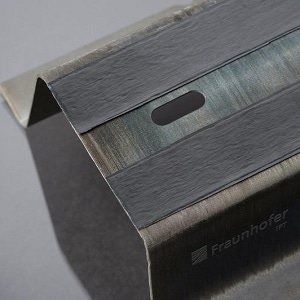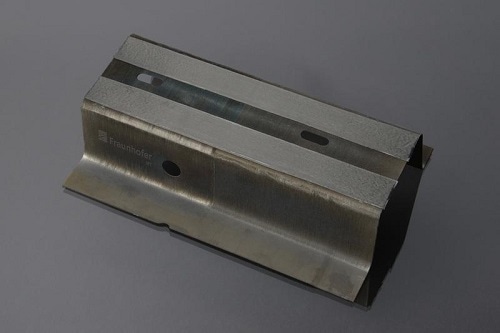Mar 20 2019
In the EU research project “ComMUnion”, the two Aachen-based Fraunhofer Institutes for Production Technology IPT and for Laser Technology ILT, in collaboration with 14 partners from industry, research and academia, are developing industrial processes and solutions for hybrid lightweight design by combining metal and polymer-matrix composites for automotive and aerospace applications. Hybrid components made of steel, locally functionalized with fiber-reinforced plastics combine high mechanical performance with low weight.

The project partners are presenting the component made using this method to the professional visitors at the lightweight construction trade fair JEC World in Paris on the “Composites in Action Area” at Booth 5D17.
Combined Process, Suitable for Mass Production
The new hybrid manufacturing process is based on a combination of laser texturing and laser-assisted tape placement:
For this purpose, components are first pre-processed using the laser to provide a specially developed, defined, rough surface structure.
- The textured surface allows the continuous fiber-reinforced thermoplastic lightweight materials, which will later be used for stiffening, to be bonded directly to the steel component.
- The bond is then mechanical, eliminating any need for additional pre-treatment measures or additional adhesion promoters, such as adhesives or bonding agents.
The stiffenings made of thermoplastic fiber-reinforced plastics, which are especially adapted to the expected loads, are joined to the component using a tape placement process.
The laser heats the thermoplastic tapes locally in the joining zone to the steel.
- The matrix material melts and flows into the laser textured cavities.
- After solidification of the melt material, the tape with the embedded unidirectional fibers adheres to the roughened surface of the steel part.
Optimized Mechanical Strength
The advantage of combining these two laser processes comes to the fore precisely when the mechanical properties of the component need to be improved locally without increasing the component’s weight significantly. The process is particularly suitable for mass production, as no further post-processing steps, such as curing operations, are required to consolidate the material after tape placement.
Additionally, precision localized heating reduces distortion and residual stresses while joining the two materials. The laser texturing process, which has been developed at the Fraunhofer ILT, can also be applied in a reproducible way to the metal surface, precisely at the locations where the textures are needed. Additionally, the laser is not subject to any tool wear.
Presentation of the First Hybrid Car Body Part at JEC World 2019 in Paris
The research partners have now finished a first demonstrator component made of high-strength steel and unidirectional fiber-reinforced thermoplastic tape in order to validate the applicability of the process in the form of a proof-of-concept. The two Fraunhofer researchers Kira van der Straeten from the Fraunhofer ILT and Tido Peters from the Fraunhofer IPT manufactured a hybrid lightweight rocker panel, a body component for the automotive industry, to test and prove the functionality of the process combination as part of the ComMUnion project.

The project partners are presenting the component to the professional visitors at the lightweight construction trade fair JEC World from 12 to 14 March 2019 in Paris on the “Composites in Action Area” at Booth 5D17. The “ComMUnion” project is funded by the Horizon 2020 Research and Innovation Program of the European Union under Grant Agreement No. 680567.